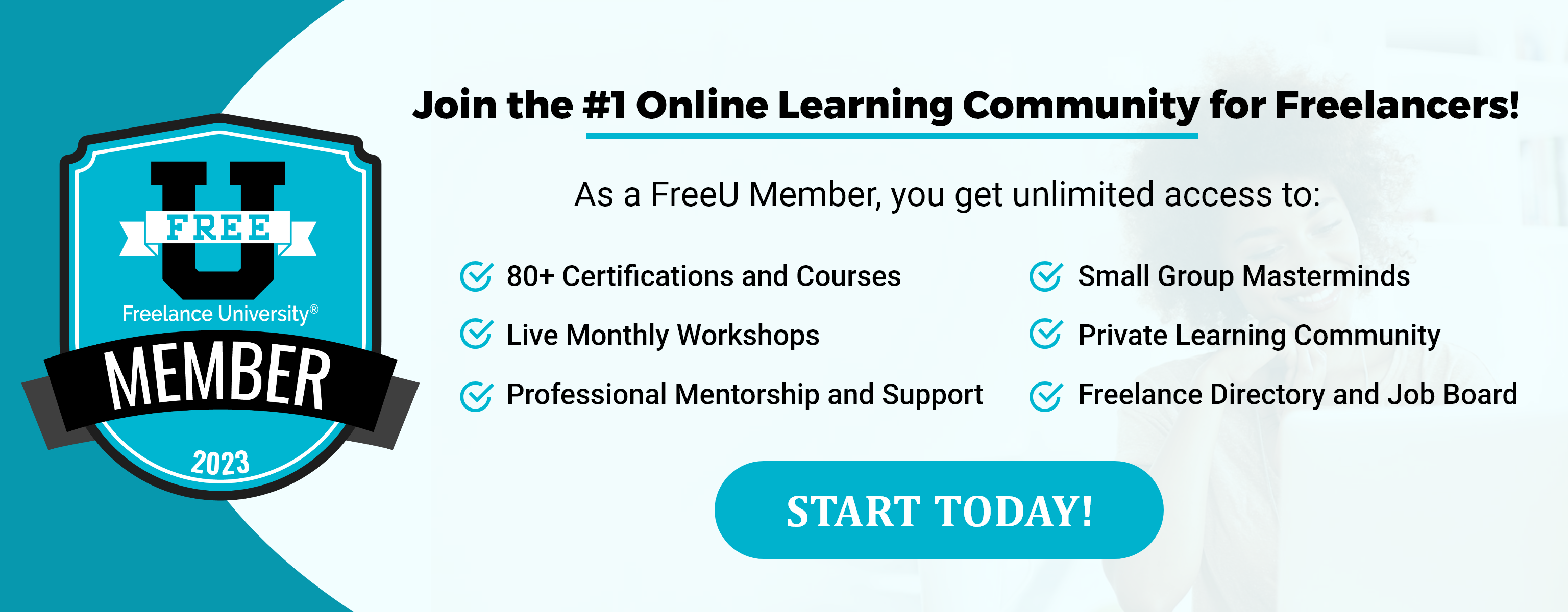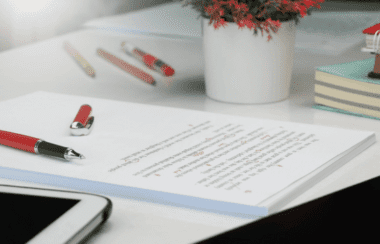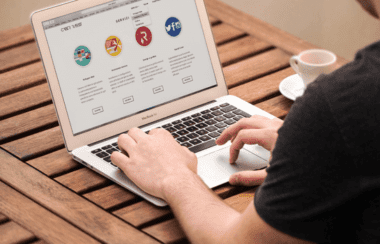10 Ways to Stay Inspired and Engaged in Your Freelance Business
By Jena Kroeker

Have you ever sat at your desk, bored and unmotivated? In the beginning, you were excited to launch your freelance business, but now you struggle to stay inspired. You’re going through the motions without any real enthusiasm.
This lack of inspiration and engagement can take many forms. Maybe you get up in the morning and say “Ugh” when you think about work. Maybe you procrastinate or are easily distracted, wishing you could avoid certain tasks. Or maybe you’re just downright bored.
In an article titled “7 Proven Strategies for Overcoming Distractions,” Deep Patel says,
“If you’re having trouble focusing and are chronically distracted, it may be that your work isn’t engaging you fully. You might feel like you’re working hard all day, but it could be that your mind is fighting boredom and looking to fill the time with something more interesting.”
That’s not the way freelancing should make you feel. After all, you have the freedom to handcraft a niche that fulfills you and fully engages your mind.
So, how do you know when people are fully engaged in their businesses? I’ve heard freelancers describe these sorts of feelings:
• Waking up before their alarm, eager to start work.
• Having so much fun, their work doesn’t even feel like work.
• Experiencing a profound sense of joy and contentment, like there’s nothing else they’d rather do.
And I’ve observed their faces light up as they describe a new service they’re launching. They’re far from bored. Instead, they have an energy that propels them into the future, trusting that it’s full of promise.
If you’re feeling uninspired and unengaged in your business right now, don’t despair. We’ll explore ten ideas to help restore motivation and interest in your work. Here we go!
10 Ways to Stay Inspired and Engaged in Your Freelance Business
1. Know your Big Why.
When work feels meaningless and pointless, it’s important to return to the basics. If you’ve read Simon Sinek’s books Start with Why and Find Your Why, you may be familiar with the concept of discovering your Big Why for your business. FreeU co-founder and instructor Craig Cannings explores a similar process in the Freelance 101 course. First of all, he recommends asking yourself the following questions:
• Why did you start a freelance business?
• What impact do you want your business to have on you, your family, and your clients?
If you discovered your Big Why when you launched your business, decide whether you’re still fulfilling the goals you set. And are you continuing to serve the type of clients you seek to impact?
Then, return to your purpose statement, or write a new one if you don’t have one. For example, you can use this formula to describe how your work impacts clients’ lives by creating certain results in their businesses:
Business Name helps Target Audience to Overcome Challenge that leads to Desired Results.
In this case, FreeU’s purpose statement would be “FreeU helps online freelancers build high-demand skills that result in rewarding client and income opportunities.” Thinking about the impact they’ll have on students is strong motivation for the FreeU founders and team to get up in the morning and begin their work.
2. Embrace the freelance lifestyle.
At a certain point, it’s important to check whether you’re allowing yourself to fully embrace the freelance lifestyle. If you previously worked in the corporate field, you may have slipped back into an employee attitude.
On one hand, you call yourself a freelancer. But on the other hand, you act like you’re stuck in a cubicle. That can wear you down. So, to stay inspired and engaged, remind yourself of these freelance freedoms:
• You’re free to design a schedule that works for you, when you’re most energetic and creative. If you’re losing motivation, take short breaks or even a power nap to clear your mind and renew your energy.
• You’re free to leave your desk during the day. Don’t feel guilty about getting your hair done, going shopping, meeting a friend, watching a movie, etc.
• You’re free to go on holiday without asking your clients’ permission. Make plans and kindly notify them ahead of time.
In essence, you are free to choose when and where to work. More on freedom of location below!
3. Maintain boundaries.
When your schedule is out of your control, it’s easy to feel discouraged and disillusioned. You’re at the mercy of your clients, and you can’t plan your own life and work. It’s a terrible place to be because you’re letting them dictate what you’re doing. Consequently, you have trouble focusing on the task at hand because you’re expecting to be interrupted at any moment.
Lack of boundaries also leads to lower engagement in your work because you think, “What’s the point? My clients will mess up my plans.” Therefore, as we discuss in a previous blog post, “How to Avoid Miscommunication with Your Clients,” be clear about your office hours and set expectations for when you’ll respond to messages. In addition, be sure to distinguish between urgent and non-urgent messages and tasks so you aren’t tempted to change your plans unnecessarily. Respect your clients’ boundaries, and encourage them to respect yours in return.
4. Assess your niche.
Have you been doing the same task or offering the same service for a long time? Do you still feel passionate about it? If not, consider whether you need to change, expand, or simply tweak your niche. For example, if your clients are starting to extend a project’s scope beyond where you’d like it to be, revisit your contract and rein in your tasks to more closely reflect your services.
If tasks are becoming humdrum, “inject your own creativity into client work” by making innovative suggestions, as we suggest in a previous post titled “How to Avoid Burnout in Your Freelance Business.”
And if work simply feels boring, maybe you need a bigger challenge. Consider this advice from the article above:
“Assess the level of unproductive busywork you’re doing. Are you having a hard time becoming engaged in the project? This could indicate that you have the capacity to take on more challenging projects. When we take on more complex work that pushes our skill and intellectual limits, we can become consumed and hyper-focused on the task. Our minds are wired to focus on anything that’s novel, pleasurable or threatening. And tackling these tasks gives us a sense of achievement.”
But when boring tasks are unavoidable, “swallow the frog” by completing your most dreaded task first, as Annie Rideout recommends in her article, “10 Motivation Tips For Freelancers Who Work From Home.” Then move on to the more enjoyable work.
5. Try a new location.
Sometimes all you need is a new point of view. As we mentioned above, the beauty of freelancing is that you can choose where you work. So, if you want to stay inspired, think about where you can go when you’re tired of your home office.
Alison Stephens gives some great advice in her article, “How to Stay Motivated as a Freelancer.” She recommends working in a coffee shop, a different country while travelling, or even a different room in your house. Indeed, working in a different room has recently done wonders for my engagement. And it wasn’t even fancy. I was working in the hallway because it was the coolest part of the apartment during a heat wave!
As Stephens says,
“A different environment is surprisingly good for boosting productivity, and regaining that motivation for building a successful freelance career. New surroundings are inspiring, so have a think about where you’d like to work when motivation wanes.”
6. Be yourself and be unique.
Now, this next advice might surprise you because I’m going to tell you not to follow other people’s advice. Not all the time, that is. Frankly, if none of the advice in this blog post resonates with you, don’t feel you have to take it. Do what works for you and find new strategies for yourself, no matter how strange they seem to others.
Essentially, it’s a way to stay inspired and engaged by not compromising your uniqueness. For instance, I’ve read many articles that recommend getting up early in the morning (e.g. at 5:00 a.m.) to achieve maximum productivity. And no matter how hard I try, I can’t turn myself into a morning person. That strategy makes me less productive and more likely to need an afternoon nap.
Instead, I’ve adopted a process of watching ‘90s music videos on YouTube before tackling an editing or writing assignment. Although I’ve never seen this recommended in an article, it’s become key to improving my own productivity. So, be yourself and be creative!
7. Don’t compare yourself to others.
This idea goes hand in hand with the previous one. And it’s a phenomenon that can sneak up on you when you least expect it. For example, I recently wrote a blog post on a “Quick Guide to Achieving Inbox Zero.” And because I’m committed to being honest and authentic, I couldn’t pretend that I was an expert in maintaining a clean email inbox. As I wrote in the article, “I need to don scuba gear and make a deep dive for buried treasure in my shipwreck of an inbox.”
So, I interviewed FreeU’s wonderful co-founder, Kelly Cannings, who is a master at maintaining a clean inbox through a brilliant system. Now, interestingly, after writing the article, I started comparing myself to Kelly and feeling inferior. I’m not a systematic person by nature, so I felt embarrassed by my messy inbox. Why oh why couldn’t I be more like Kelly?
Thoughts like these need to be acknowledged but then rejected. Above all, don’t compare someone else’s success with your own and make yourself feel inadequate. Otherwise, you run the risk of losing motivation and trust in your own abilities.
In an article titled “How To Stop Comparing Yourself To Others,” Caroline Castrillon says,
“When comparing yourself to others, you focus on their strengths and ignore your own. So, go ahead and make a list of your achievements. It doesn’t matter what they are, big or small, as long as they are something you’re proud of. If you ace a project at work, record it. If you help a friend in a crisis, add it. If you drag yourself to the gym on a morning you didn’t want to go, write it down. Include everything you can think of. Then reflect on that list and post it somewhere where you can see it every day.”
8. Update your skills and/or add new ones.
Another reason for losing inspiration and engagement is feeling like work has become too difficult. As technology develops, you may need to learn how to use new tools or replace current skills that have become obsolete. You don’t want clients turning down your services because your methods are out of date.
Since technology changes quickly, stay informed of new developments by following resources like articles, blogs, and podcasts related to your niche. Access courses and webinars to sharpen your skills.
Basically, this tip relates to the one above about assessing your niche. As you expand or change your niche, using the most up-to-date skills and tools will enhance your productivity. It will also refresh your perspective and provide exciting new challenges if you’re becoming bored with your current skills and tools.
9. Start or join a mastermind group.
Do you ever feel lonely while freelancing? Sometimes we need others to help us stay inspired. Cheryl Lock recommends joining or starting a “work club” in her article, “How to Stay Motivated as a Freelancer.” She says, “Finding a group of like-minded freelancers who work in the same field (or even a different one) could help hold freelancers accountable to specific goals, something that traditional coworkers and bosses often do in a regular workplace environment.”
Similarly, a mastermind group can help inspire new ideas you may not think of on your own. And it can give you the courage to persevere during hard times in your business. Ultimately, being challenged to think outside the box can reignite your passion for your work. And meeting with others reduces the monotony of working alone.
10. Keep your rates up to date.
There’s nothing like being underpaid to destroy inspiration and engagement. If you’ve been freelancing for a long time, it’s easy to forget about rates. The years pass quickly, and before you know it, your rates are out of date. You work hard and feel like you’re receiving little in return. And you have a nagging feeling that you’re worth more.
In FreeU’s “Pricing Your Freelance Services” course, instructor Craig Cannings says, “If you price TOO low, you could hurt your credibility and authority as a specialist in your field” and “undervalue the quality of your own work.”
Therefore, he recommends these strategies:
• Research blogs, industry associations, Facebook and LinkedIn groups to identify the “going rates.”
• Review 5-10 freelancer websites to determine how they are pricing their services.
• Identify the “going rates” based on hourly and package pricing.
Repeat this process at regular intervals to ensure you’re always attaching proper value to your work. As I always say, dance like it’s 1999, but don’t price that way.
Final Thoughts
So, there you have it – 10 ideas for staying inspired and engaged in your freelance or virtual assistant business! And as I said above, be yourself and be unique! Remember what you have to offer and choose strategies that best fit who you are.
With that in mind, we’d love to hear your thoughts. Have you ever struggled with a lack of motivation in your work? If so, how did you overcome it? Please share your tips and ideas in the comments below!









































































































